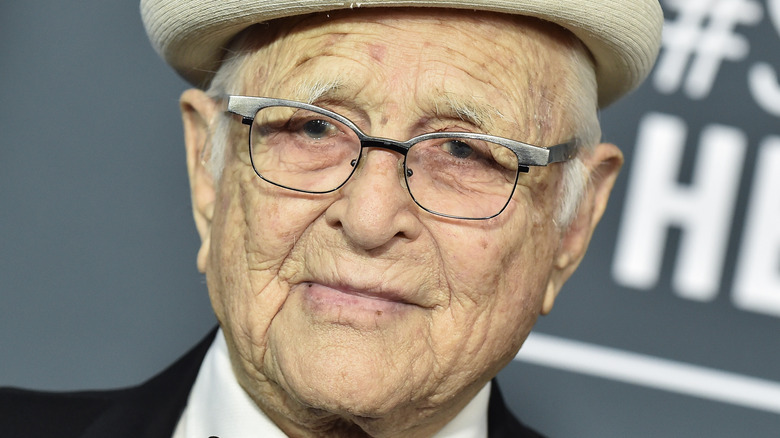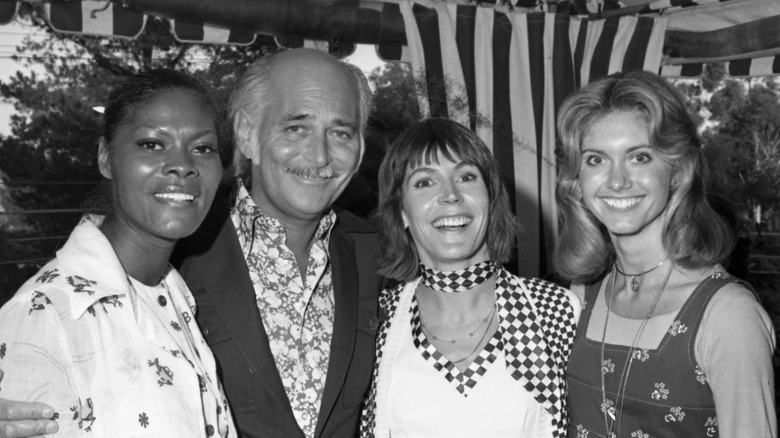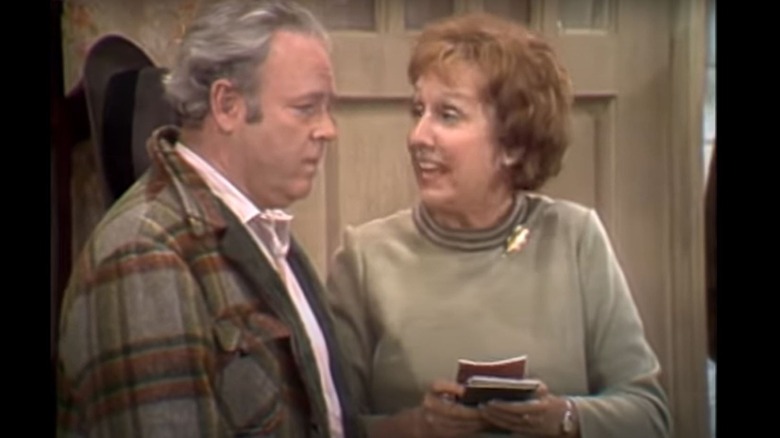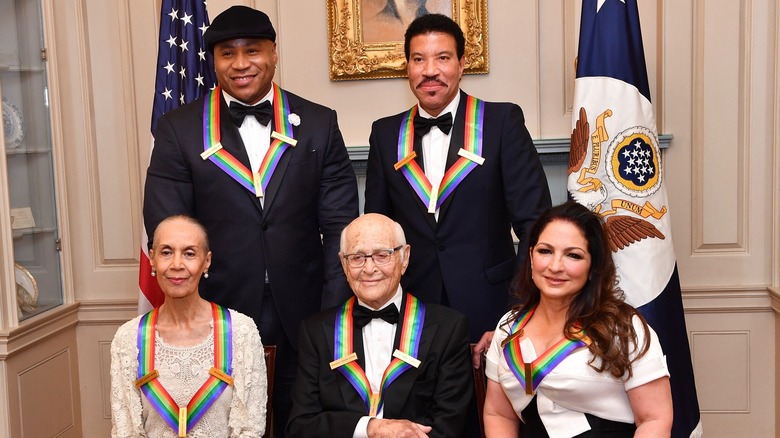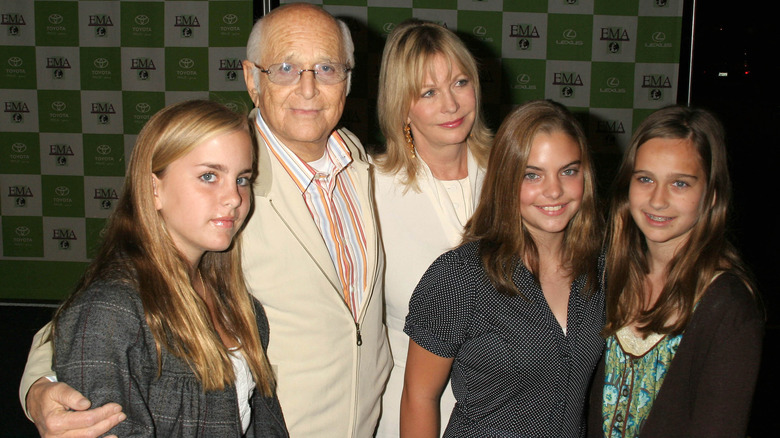Iconic TV Producer, Norman Lear, Dies At 101
The world was saddened to learn that comedic television maestro, ardent believer in free speech, and all-around beloved person, Norman Lear, has died (via Variety). He was 101 years old.
It's hard to think of a more impactful, pervasive presence in shaping American television, particularly sitcoms, than Norman Lear. His name is attached to practically every significant show of the era as writer and producer: "Maude," "Sanford and Son," "All in the Family," "Good Times," "The Jeffersons," and many, many more listed on the official Norman Lear website. Truly, few people have had as much of a direct influence on shaping the American psyche, directly into people's homes through TV screens, as Norman Lear. Or as President Bill Clinton said in 1999 when he gave Lear a National Medal of the Arts (via PBS), "Norman Lear has held up a mirror to American society and changed the way we look at it."
And yet, as successful as Lear was in entertainment and the arts, he was a socially involved, activist-minded individual who created numerous charities and institutes related to the role of the arts in society, environmental responsibility, and business innovations.
Childhood notes from King Lear
Norman "King" Lear was born Norman Milton Lear in 1922 in New Haven, Connecticut to a Jewish-American family. At a young age, as he says on Forward, he discovered that "people disliked me because of my Jewishness," continuing, "My sympathies, my empathy went out to people who are automatically disliked just because of who they are." This, plus his parent's household repartee, as The Famous People tells us, formed the foundation of Lear's comedic outlook. He continued, "I was the class prophet, so I wrote the class play in high school. I also wrote a humor column, 'Notes to You From King Lear,' in the Weaver High School newspaper." And yet, Lear never really considered writing comedically as a career.
Lear enrolled in Emerson College in Boston upon completing high school, but never got the chance to finish because World War II broke out. He dropped out of school in 1942 to enlist in the United States Air Force against his mother's wishes. In an interview on AR Gunners, Lear said, "it was that time of life in America we were so in love with the country we, speaking for myself, I had to be there." Lear wound up flying 52 missions and dropping 33 bombs, and for this, he received the Air Medal with four Oak Leaf Clusters.
After being discharged in 1945, Lear moved to California, where he more or less fell into the work that would define his life.
Humor, humor everywhere
When Norman Lear moved to California, it was with the intention of beginning a career in public relations, as The Famous People says. However, after running into his cousin, Ed Simmons, the two teamed up to try their hand at writing comedy sketches. They got hired by legendary comic Jerry Lewis in the 1950s to write for his and Dean Martin's skits on the "Colgate Comedy Hour," as well as for other gigs. This is all it took for Lear's and Simmon's careers to take off. Simmons went on to write for shows like "The Jerry Lewis Show," "The Red Skelton Hour," and "The Carol Burnett Show" (via IMDb), while Lear worked on "The Tennessee Ernie Ford Show" and "The George Gobel Show" before starting his own production company, Tandem Productions, in 1958 (via PBS).
Thus began the era of Lear's life that most people know him for, where he created, wrote for, and produced the sitcoms that would both define and alter the television landscape forever after. "All in the Family," "Sanford and Son," "The Jeffersons," "Good Times," "Maude," and more: Lear worked on over 100 shows in total, at one point nine of them simultaneously, as the Times of Israel says, particularly during the 1970s.
"There is humor everywhere," he said. "Standing with a group of people watching a casket go into the ground and [you see] the chief mourner scratching his [tuchas]. There is humor there. Where there is humanity, there is comedy."
Defender of civil liberty and love, itself
In the end, as IMDb shows, Norman Lear won four Emmys, a Peabody Award, the aforementioned National Medal of Arts, a Golden Globe, an Oscar nomination for 1967's "Divorce American Style," a Kennedy Center Honor, and much, much more. The Times of Israel says that about 120 million people tuned in every week to watch the shows that Lear wrote and produced. As Lear puts it, the unifying theme throughout his works was, despite the ostensible belligerence of certain characters like Archie Bunker, love. "All the arguing and craziness was all about love," he said. "Love of country, love of fairness, love of what could go right in the world, and love of one another."
Such words exemplify Lear's sense of responsibility towards his work, its impact, and society at large. This is why he branched off from indirect social and political work to the direct creation of non-profit organizations and various institutions. The 1981-created People for the American Way, for instance, is a free-speech supporting, civil liberties organization still at work today. The Norman Lear Center at the USC Annenberg School for Communication and Journalism (2000-present) focuses on supporting policies that integrate the economy and the arts, as the Norman Lear Center at the University of Southern California says, while Business Enterprise Trust (1989-2000) highlights innovations in American business. Lear even bought one of the only remaining copies of the Declaration of Independence and toured with it around the U.S.
Health and a big family
Norman Lear lived a long and healthy life; in 2022, he celebrated his 100th birthday. Or as he said on Variety, "I think the big secret is never forgetting to wake up in the morning. It starts with getting out of bed." He also said that 100 years old "feels very much like 99, which felt a lot like 89!" Lear was still working and involved in various projects through his late life, even with Netflix (via the University of Southern California's Lear Center), making him one of the only individuals to work in film and television all the way from Hollywood's Silver Age to the streaming era.
At home, Lear was indeed steeped "all in the family." He had six children over three marriages, as Closer Weekly tells us: Ellen, Kate, Maggie, Benjamin, Brianna, and Madelaine. He got married for the first time during World War II in 1943 to Charlotte Rosen and remained married to her until 1956. Lear began his career in entertainment during this time. He married his second wife, Frances Loeb, that same year, and stayed married to her until 1985. Lear married his final wife, Lyn Davis Lear, in 1994, and remained married to her all the way to his death. Three of Lear's children — Benjamin, Brianna, and Madeline — came from this marriage. Lyn Davis said of Lear, "He's the last of the real romantics."
Lear is survived by his wife, his six children, and four grandchildren.
